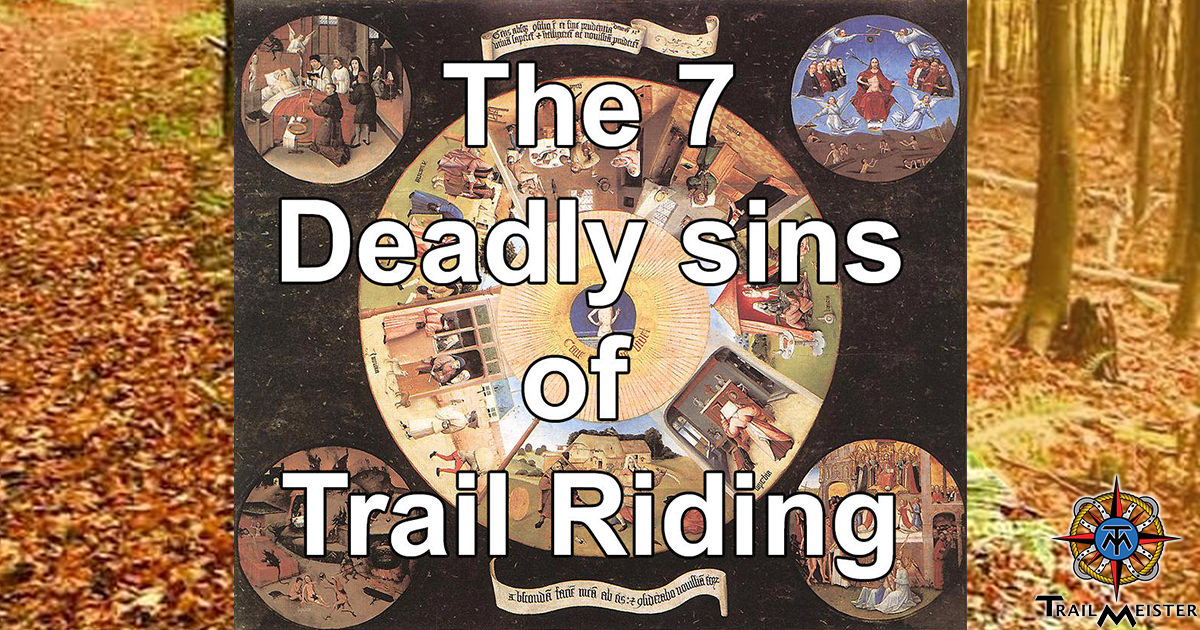The 7 Deadly Sins of Trail Riding
I may not attend church as often as I should, but I still remember many of the concepts. For example, the Seven Deadly Sins. Anyone that spends time with equines knows that these ideas make sense whether we’re in church or on the trail. Here are my seven sins of trail riding.
Gluttony – Don’t expect a green, unconditioned horse to carry you for miles and miles down a trail. The word derives from the Latin “gluttire”, meaning to gulp down and has been interpreted as selfishness; essentially placing concern with one’s own impulses or interests above the well-being or interests of others. In this case, the well-being of our horses and mules. Your horse needs to be in good physical condition, especially if you plan to embark on demanding trail-riding adventures. You’ll need to slowly work up to the demands an all-day ride over varied terrain will place on your equine friend.
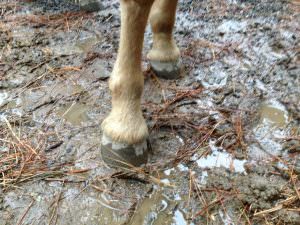 Greed – Avoid riding when your horse’s hooves will damage the trail. Also, known as avarice, greed is a sin of desire. I love riding and the itch to put a boot in the stirrup is a strong one. Sometimes it needs to be tempered. It’s true, horses and mules are designed to cope with wet, muddy trails. But those broad hooves can leave the trails a lot worse for wear, especially during the late spring freeze/thaw cycle. Spring runoff can leave trails waterlogged and vulnerable to damage from trail users. This doesn’t mean that you should hang up your saddle until Memorial Day. It only means that you’ll have to think of alternatives to sodden, single-track trails.
Greed – Avoid riding when your horse’s hooves will damage the trail. Also, known as avarice, greed is a sin of desire. I love riding and the itch to put a boot in the stirrup is a strong one. Sometimes it needs to be tempered. It’s true, horses and mules are designed to cope with wet, muddy trails. But those broad hooves can leave the trails a lot worse for wear, especially during the late spring freeze/thaw cycle. Spring runoff can leave trails waterlogged and vulnerable to damage from trail users. This doesn’t mean that you should hang up your saddle until Memorial Day. It only means that you’ll have to think of alternatives to sodden, single-track trails.
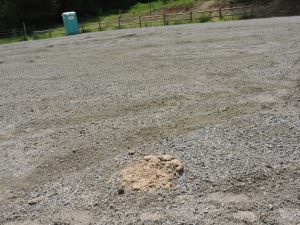 Sloth – Don’t litter. From the Latin “acedia” which translates as without care and refers to laziness, indolence, and idleness. If you managed to carry it out with you, you can carry it back with you. Litter damages the environment harms wildlife, and leaving it behind is just lazy and inconsiderate. Put it in your bag, then put it in the bin or recycling when you get back home or to the trail head. Oh yea – pick up your manure at the trailhead!
Sloth – Don’t litter. From the Latin “acedia” which translates as without care and refers to laziness, indolence, and idleness. If you managed to carry it out with you, you can carry it back with you. Litter damages the environment harms wildlife, and leaving it behind is just lazy and inconsiderate. Put it in your bag, then put it in the bin or recycling when you get back home or to the trail head. Oh yea – pick up your manure at the trailhead!
Pride – Please wear a helmet. From the Latin “superbia”, pride has been labeled the father of all sins. There are many excuses for not wearing riding helmets. Yet research has repeatedly shown that a properly fitted, safety-approved riding helmet can drastically reduce the risk of head injury. For you “experienced riders” who don’t need a helmet; a Canadian study found that injured riders had an average of 27 years of experience. New riders were safer, perhaps because they were more cautious.
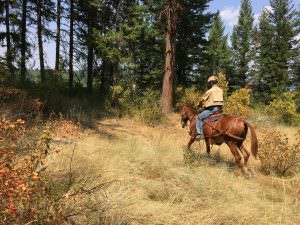
Wrath – Don’t be rude. Anger or “ira” from Latin is an intense emotional response to a perceived provocation, hurt or threat. Remember that bicyclist that came charging behind you, nearly face planted into the back of your horse, then whipped past on a narrow section of trail? Not nice, was it? What was your response? Did you explain why that wasn’t safe, or did you get angry because you were afraid? Yoda said it well with “Fear is the path to the dark side. Fear leads to anger. Anger leads to hate. Hate leads to suffering.” Try this when you meet another trail user. Eye contact, a friendly hello. You can even ask how their walk or ride is going! I guarantee you’ll leave the situation feeling better for it.
Here’s a magazine column on the benefits of “Just Saying Hello”!
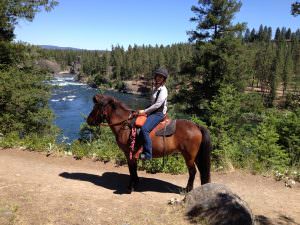 Despair – Don’t forget to have fun. From the Latin “tristitia”, despair is a state of low mood and aversion to activity. I write a lot about the harder parts of trail riding and horse camping. In part I do that because I think it’s important to show the real nitty –gritty aspects of being on the trail and camping with our horses and mules – You know as a counter to all of the perfectly curated Instagram feed out there. But in that pursuit sometimes I forget that trail riding isn’t all navigation skills and conditioning. As hard as it can be, trail riding is also really fun. Yes, there’s some risk but instead of being the kind of risk that leaves you frozen in terror, it feels like the moment when you step on a plane to go somewhere you’ve never been before.
Despair – Don’t forget to have fun. From the Latin “tristitia”, despair is a state of low mood and aversion to activity. I write a lot about the harder parts of trail riding and horse camping. In part I do that because I think it’s important to show the real nitty –gritty aspects of being on the trail and camping with our horses and mules – You know as a counter to all of the perfectly curated Instagram feed out there. But in that pursuit sometimes I forget that trail riding isn’t all navigation skills and conditioning. As hard as it can be, trail riding is also really fun. Yes, there’s some risk but instead of being the kind of risk that leaves you frozen in terror, it feels like the moment when you step on a plane to go somewhere you’ve never been before.
Lust – Inconsistency. St. Augustine equated lust as “disordered love”. With horses that disordered love can take the form of inconsistency where we send our animals mixed messages. Indeed, some horses receive training that is consistent enough in its inconsistency that they recognize that different rules apply in different surroundings. Most do not. Remember that every time you swing your leg over your horse, you are training him. You are either training him well or training him badly, but you are nevertheless training him. It’s not just a trail ride.
Ride safe. Ride Often. Ride with TrailMeister!


